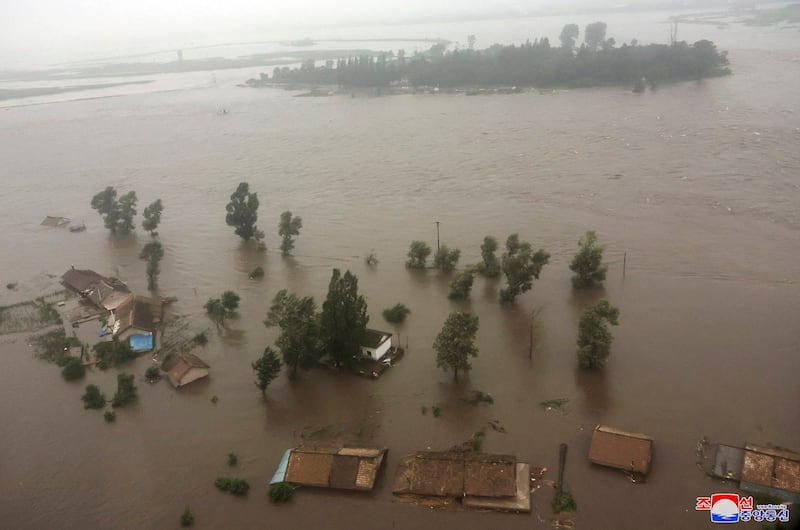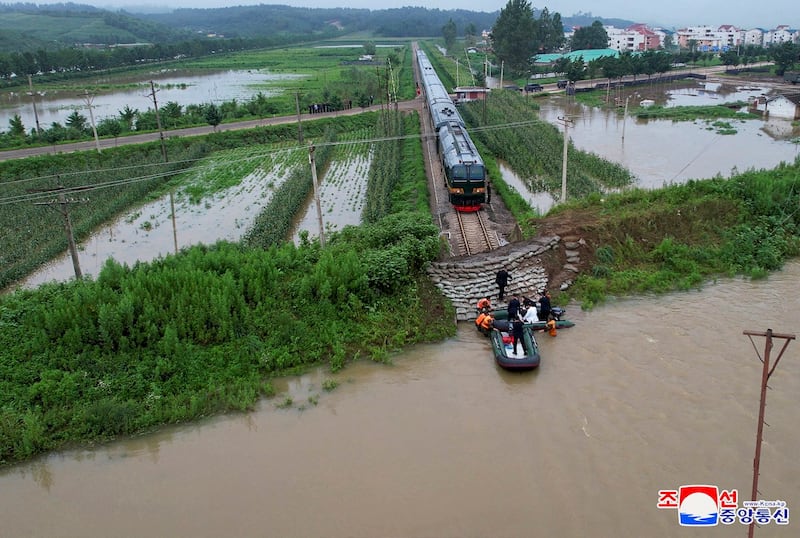North Korean leader Kim Jong Un has been spotted in state media leading flood relief efforts after heavy rains caused the Yalu River to swell, inundating sections of nearby towns, residents in North Korea and China told Radio Free Asia.
More than 5,000 people who were stranded by the floodwaters were saved by on-site instructions relayed by Kim, the state-run Korea Central News Agency reported, complete with photos showing him leading the rescue effort.
The South Korean government said that there was a high possibility of casualties given that North Korea was reporting about the rescue effort in such detail.
Some of the residents were trapped when they did not heed warnings to evacuate and stayed in their homes, residents said. Meanwhile, North Koreans who have been dispatched to work in China are being forced to donate to a flood relief fund from their pay.
A resident who requested for security reasons only to be identified as living near the Yalu, told RFA Korean that residents in and around Hyesan, in the northern province of Ryanggang, were facing “life threatening” moments since the river’s waters began to overflow.

“The water level of the Yalu River fluctuated by up to two meters (more than 6 feet) within an hour,” he said, adding that a vehicle equipped with a loudspeaker went from village to village along the river, instructing people to urgently move to higher ground.
“Despite this, the residents just stood on the levee of the Yalu River, unsure of what to do, and did not evacuate,” the resident said.
Most did not want to evacuate because they did not want to leave their belongings behind for opportunistic thieves, he said.
“The area around the Yalu River has high property prices, and people with a higher standard of living in Hyesan City reside there,” he said. “Because they could not suddenly move their expensive belongings, such as refrigerators, televisions, and sewing machines, they were unable to evacuate despite knowing the danger.”
He said that most North Koreans cannot afford things like televisions and sewing machines even after working hard for decades.
“If the house was left empty, thieves would rush in and steal all the property in an instant, so the people felt they could not evacuate even when the water rose.”
The Yalu floods have also affected Dandong, China, which lies across the river from North Korea’s Sinuiju, a resident in Dandong told RFA, on condition of anonymity for personal safety.
“The Yalu River overflowed, causing water to rise up to sidewalks in Dandong,” she said. “On the other side of the river in Sinuiju, North Korean soldiers were stacking sandbags all day.”
An island in the river located 2 kms (1.24 miles) upstream from Sinuiju was submerged according to reports.
Relief payments
When the flooding began, the North Korean government began asking workers it dispatched to China to donate to relief efforts. But just one day later, the government stopped asking and ordered them to donate, residents in China said.
According to a report by the UN Expert Group on North Korea Sanctions published early this year, there are about 100,000 North Korean workers in over 40 countries, but mostly in China and Russia. Their presence is a violation of UN sanctions that required all dispatched workers to return to North Korea by the end of 2019 with no new worker visas issued.
North Korea has been known to get around sanctions by sending the workers on student or tourist visas.
“An order to raise funds for flood recovery was issued today at the Dandong Branch of the Consulate General in Shenyang,” a resident of Dandong told RFA on condition of anonymity for personal safety.
He said that news reports showing Kim Jong Un leading rescue efforts kept coming in to companies in Dandong, so they convened an emergency meeting for each work unit and ordered them to contribute to the relief effort personally.
“However, most of the workers dispatched to China were passive about providing financial support, even though they were saddened by the reality of their country suffering from heavy flood damage,” he said. “Through the meeting, some workers decided to donate 10 yuan (US$1.30) from their monthly salary, while others decided to donate up to 30 yuan ($4.15).”
The purpose of their being overseas is to raise foreign currency for the cash-strapped government, so they are already forced to donate the lion’s share, and are paid only a fraction. To have to donate even more increases their hardship, the Dandong resident said.
“The reason North Korean workers are reluctant to participate in support projects is because it is difficult to live on only 300 yuan ($41.50) each month,” he said. “They’re out here saying that flood recovery should be something that the government should take care of.”

A Chinese citizen of Korean descent in Dandong said that the North Korean consulate in Shenyang later required that each worker donate 200 yuan ($27).
“Workers were initially expected to contribute 10 yuan ($1.38) each, with officials donating 50 yuan ($6.92),” he said. “When this failed to raise the necessary amount, they upped it to 200 yuan.”
He said the workers are angered that they are being made to donate so much.
“It is unfortunate that three days of heavy rain led to flood damage, but the people are complaining, wondering if they will lose all of their already tiny salary.”
Translated by Leejin J. Chung and Claire S. Lee. Edited by Eugene Whong.
